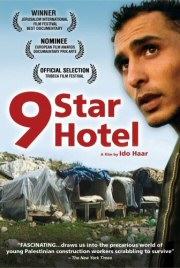 With the temperature dropping, it's time to find someone to keep you warm. Find your hookups with our online dating guide!
With the temperature dropping, it's time to find someone to keep you warm. Find your hookups with our online dating guide!
- Rated NR
- Documentary
- 2007
- Buy DVD
Reviewed by Jeff Giles
()
n the interest of minimizing confusion, let’s get something out of the way right off the bat: Ido Haar’s “9 Star Hotel” is not about a hotel. In fact, no hotels appear anywhere in the movie, so don’t buy or rent it looking for soapy, Arthur Hailey-inspired drama. The glamour suggested by the title is wholly ironic, actually – director Ido Haar spends the duration of the film’s 78 minutes following a group of young Palestinians as they risk life and limb to illegally enter the Israeli town of Modi’in. Why do they go to all the trouble? Are they stealing? Dealing drugs? Organizing suicide bombings? All of the above?
None of the above. Haar’s subjects are construction workers, desperate for work, forced into dire straits by restrictive measures from the Israeli government (not the least of which is the border wall whose steadily advancing construction provides a backdrop for the entire film). Nine out of 10 Americans probably couldn’t point to Palestine on a map, let alone tell you why Palestinians and Israelis have been locked in a bloody downward spiral for decades; for this reason, “9 Star Hotel” is a positively invaluable film, as it puts a human face on an unbelievably messy international struggle.
Haar’s message resonates on any number of levels, really. Watching his subjects scramble across the river every morning, dodge traffic every afternoon, and hunker down in makeshift “sheds” (really just boards nailed into containers, barely bigger than coffins, covered with tarps and carpets, and stuffed with random accoutrements picked up while rummaging through Israeli dumpsters) at night, it’s hard to escape the parallels to the American immigration debate. Watching the men – teenagers, really – make dinner out of what looks like food scraps boiled in a garbage can lid, it’s hard not to wonder what the hell is wrong with the human race that leaves us inured to systematic acts of cruelty. Watching them wringing out their clothes after slogging through the mud and rain, it’s difficult to fathom how so many of us came to live lives of such unbelievable luxury, while others subsist on so little.
In other words, “9 Star Hotel” is absolutely an important film. But that doesn’t make it a good film. It’s impossible to find fault with Haar for this – he was, by virtue of necessity, simply lugging a camera around the hills outside Modi’in – but still, for a record of such a terribly dramatic existence, the movie often feels curiously logy. Some of this can be chalked up to American sensibilities: we’ve been conditioned to expect periodic bursts of action in our movies, or at least something resembling a story arc, and though Haar’s protagonists are definitely forced to deal with their fair share of action, his lens really isn’t doing anything more than capturing his subjects’ day-to-day lives. What Haar gains in ground-level perspective by staying so tightly focused on these workers, he loses by avoiding any outside context. The film feels curiously unfinished.
It won’t surprise you to learn that there isn’t a happy ending for the movie’s stars, but the underlying message here is still one of hope. It bears mentioning that Haar is an Israeli filmmaker – he was inspired to make “9 Star Hotel” after seeing groups of men running across the highway and wondering where they came from, and where they were headed – that the producers are also Israeli, and that it won Best Documentary at the Jerusalem International Film Festival. Israel and Palestine may be mortal enemies, but many of the people forced into their battles are bound more by compassion than ideology. We need to believe that eventually, the former may prove itself stronger than the latter.
You can follow us on Twitter and Facebook for content updates. Also, sign up for our email list for weekly updates and check us out on Google+ as well.











